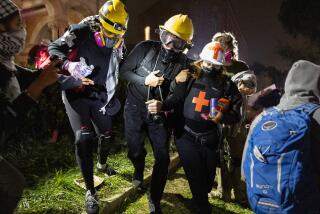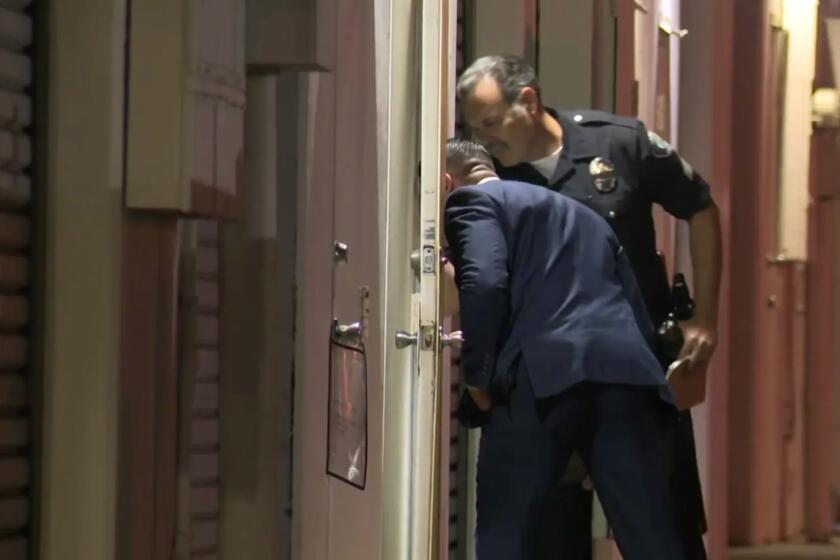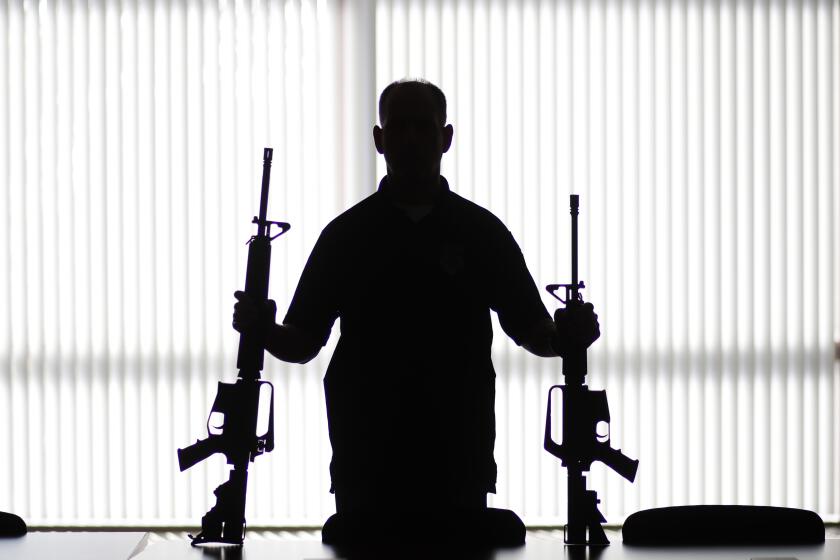Hiring Bad Guys: Who Else Does Covert Work?
A series of articles in the San Jose Mercury News last month alleged that the CIA was somehow involved in a scheme to sell crack cocaine to Los Angeles street gangs in the 1980s to finance the Contras in Nicaragua. After it appeared, both Sen. Barbara Boxer (D-Calif.) and Rep. Maxine Waters (D-Los Angeles) demanded an investigation and the Congressional Black Caucus demanded, and got, a meeting with CIA Director John M. Deutch.
What’s most interesting about the series, however, is its implicit notion that intelligence agencies shouldn’t have any truck with the world’s bad guys. It’s an assumption that reveals how little some people seem to understand how the intelligence business actually works.
The issue of whether the CIA should be allowed to deal with disreputable, even immoral, characters came to light recently: The CIA kept on its payroll a Guatemalan army colonel named Julio Roberto Alpirez, who may have been involved in the 1990 murder of an American and the 1992 torture-murder of a Guatemalan rebel leader married to an American. The uproar in the United States was enormous. The CIA seemed to be covering up heinous murders to protect one of its clandestine sources. This was an unpleasant, thoroughly tangled business, and seemed a classic example of CIA perfidy.
So what was the truth? The President’s Intelligence Oversight Board this summer issued a rare public report on the matter (normally, its findings are kept classified), concluding that Alpirez probably didn’t order the murder of the American nor was he present during the killing, but was involved in covering it up. It found, further, that CIA officials were not complicitous in the murder. But the report did find that the CIA paid insufficient attention to allegations of human-rights abuses in Guatemala, and--most serious in official terms--it failed to notify Congress properly. Not keeping congressional oversight committees “fully and currently informed” is a violation of the agency’s statutory obligation. The report concluded, though, that the CIA didn’t intend to mislead Congress--it was just trying to protect sources.
Yet, in October 1991, long before the whole tawdry affair became public knowledge, the CIA notified the Justice Department of allegations that Alpirez was involved in the death of an American. Justice ruled that Alpirez wasn’t prosecutable in the United States; there wasn’t enough evidence. Shortly thereafter, my sources tell me--before the scandal became public knowledge--the CIA decided to terminate its relationship with Alpirez. There was debate within the agency over whether to pay Alpirez money he was owed--and it was decided that he would be paid.
What did the CIA get out of this unhappy relationship? Fairly substantial intelligence on the Colombian drug cartels. The White House report found that the CIA intelligence-gathering successes in Guatemala were “at times dramatic” in reducing the flow of illegal-narcotics trafficking.
Was it worth it? It’s a tough, even gruesome, calculus: Paying a nefarious character for his intelligence on narcotics trafficking and terrorism in the region, and, in the process, seeming to condone torture and murder there. There’s no question that the CIA’s hands weren’t exactly clean.
But it’s not quite the same thing as the CIA’s being “involved” in murder in Guatemala, as many press reports had it. Rep. Robert G. Torricelli (D-N.J.) thundered that U.S. taxpayer money was used by the CIA to pay Guatemalan torturers and murderers. And, strictly speaking, he’s correct. Guatemala, like Honduras and a number of other countries around the world, is a nasty place. Its military teems with murderers and torturers. Its human-rights record is reprehensible. So if the CIA recruits an informant in the Guatemalan military, he’s unlikely to be an upstanding citizen.
And the Guatemala business is only the most recent example of the CIA’s involvement with thugs around the world. The examples--those we know about, anyway--are legion. The agency kept Panama’s Manuel A. Noriega on the payroll for years because they thought he’d help overthrow the Sandinista government in Nicaragua and defeat the insurgency in El Salvador. Noriega kept his end of the bargain: He allowed Panama to be used for training and resupplying the Nicaraguan Contras and for training Salvadoran military officers. And when the U.S. government decided Noriega had become more of a liability than an asset, the agency terminated its relationship with him--but only under protest. The agency insisted it was getting useful intelligence.
To keep the brutal Salvadoran regime in power--and defeat communist influence there--the CIA played a key role in creating the infamous death squads. It also reportedly provided covert support for the Khmer Rouge in Cambodia; allied itself with the apartheid government in South Africa; built the Nicaraguan Contra army out of the remnants of the Somoza dictatorship’s National Guard, and kept close financial ties to the famously corrupt Bank of Credit & Commerce International. It provided money and support to Pakistan’s military dictatorship. In 1993, the agency even intervened with the Justice Department to get criminal charges dropped against a pair of Polish arms brokers who explicitly violated the U.N. arms embargo against Iraq--because the two had been useful to the CIA in its secret war in Afghanistan.
The CIA, in short, has had a long and inglorious relationship with the world’s bad guys. Is that wrong? Sometimes, yes, but sometimes, no. In the aftermath of the Guatemalan affair, Deutch announced new guidelines requiring case officers to inform headquarters of any criminal actions or human-rights abuses by potential agents. These guidelines don’t say we shouldn’t deal with, or hire, thugs; they merely codify the procedures by which CIA management decides whether a potential asset’s wickedness is outweighed by the value of the information he might provide. That’s a cold, realpolitik calculation--and there’s nothing new about it. Similar guidelines have long been in place at the CIA.
This ethical dilemma has long roiled the intelligence community: When is dealing with unsavory individuals simply not worth it? An enormous amount of time and energy is spent within the agency trying to determine whether the people we’re dealing with abroad might do something that will come back to haunt us. Spy jargon for such repercussions is “blow-back,” and it’s always part of an agency manager’s calculus.
The CIA, we tend to forget, acts not for its own sake but on behalf of a client, usually the president. But it also has to be enormously concerned about the opinion of the people who fund it--the Congress. So it doesn’t want to do something that might undermine support on the Hill. To assume that the CIA turns a blind eye to the malfeasance of its foreign assets is naive. The question you often hear on the seventh floor of CIA headquarters, where the muckety-mucks have their offices, is, “How will it play in the Post?”
The queasiness that so many Americans have about having foreign bad guys on the CIA’s payroll is understandable--but it’s wildly inconsistent. No one objects when the FBI pays Mafia informants generously for leads, and the less said about the Drug Enforcement Agency’s informants, the better. In the intelligence business, you need the help of other criminals to catch criminals.
If the CIA is so fortunate as to snag an informant inside Hezbollah, or any other terrorist cell, he’s going to be a ruthless terrorist--or else he’s not going to be there. The same goes for sources, or potential sources, inside Saddam Hussein’s circle; or in the presidential palace in North Korea. They’ll all be human-rights violators, perhaps environmental polluters, too. Former CIA Director James Woolsey cites a Biblical analogy: “When Joshua dispatched two case officers to Jericho, it didn’t matter that the agent they recruited there to establish a safe house was a prostitute--a “harlot,” as King James puts it.”
Where the morality of dealing with dirty characters becomes maddeningly difficult is in the realm not of pure espionage, or intelligence-gathering, but clandestine activity, or covert action--which actually takes up less than 5% of the CIA’s budget. Here you have to be extremely careful with whom you’re dealing: You don’t want to overthrow a government of thugs only to replace it with a government of even bigger thugs.
In today’s world, you have to weigh the moral implications, size up the potential damage to U.S. prestige and to our ability to push credibly for human rights around the world. And there are even more pragmatic considerations. Take the CIA’s massive secret war in Afghanistan, the agency’s biggest cover operation since Vietnam, where it spent some $10 billion arming and training the moujahedeen to fight the Soviets. We threw support behind not those we found to be most morally upright, but behind the fiercest warlords, the fanatics, who hated America only slightly less than they hated Russia. As a result, we ended up training Islamic fundamentalists in the art of war, and the blow-back from this--the bombing of the World Trade Center and other acts of terrorism inflicted on the West--hasn’t stopped. Sometimes, the enemy of my enemy is my enemy, too.
Yet, an effective spy service is our immune system; it cannot avoid contact with the pathogens that threaten us. To do its job properly, the CIA may turn out to be, as Shakespeare wrote, “much more the better for being a little bad.”
More to Read
Start your day right
Sign up for Essential California for news, features and recommendations from the L.A. Times and beyond in your inbox six days a week.
You may occasionally receive promotional content from the Los Angeles Times.






